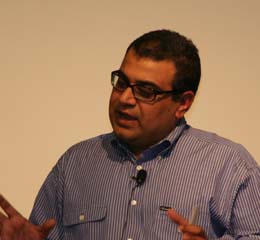Om Malik: What Really Makes Startups Work From a Press Perspective
This is part of my set of notes from the Startup School 2006 sessions at Stanford.
Om Malik is a writer for Business 2.0 who sees dozens (if not hundreds) of startups and products. During this session, he shared his observations on what makes a startup successful.
Successful Companies Cause Changes in Behavior
- Example: index cards ($5 billion) v. PowerPoint ($1 billion)
- Flickr – why did they succeed? Because they didn’t have the boneheaded ads like their competitors. A clean user interface – very simple. There is nothing more annoying that having to sign up for a service to see a photo. It changed the way we store and catalog photos with the addition of tags; it changed the way people catalogs their images. Similarly, del.icio.us changed the way I stored my bookmarks.
- If you can change people’s behavior, you’ve got a winner
- iPod – changes the way people used their music. Your entire music library in your pocket!
- Memeorandom – changes the way how news comes to you from blog
- Problem is that Web 2.0 is developing for geeks; developing for Firefox, ignoring IE. They’re ignoring regular people, people not in Silicon Valley. What’s cool is never what’s profitable.
- BlogLines – changed the way people consumed RSS. Many people who don’t even know what RSS is can still use BlogLines
- Believe this is the difference between the winners and the losers
- Keep things simple – it’s the hardest thing. If you keep it simple and listen to people (look to the guy pumping your gas) and how they experience the world, then that’s how you can figure out how to reach the users.
- Most of the products I see are severely over-engineered; they take me fifteen minutes to figure out what they do! Come on, tell me in one line what you do – if you can’t, you shouldn’t be doing what you’re doing. Time is the only thing which is not a commodity in our existence; time has no price, and it’s not falling. So in order to get your customer, to respect their time, keep it simple. That’s how you win. Listen to the world.
- Fortune magazine did an article on how the corporate cube culture was causing a slacker attitude – it’s actually the biggest opportunity ever! You’re sitting in your cube after lunch in your cube coma, and what do you do? You go to YouTube! Haven’t you noticed that YouTube’s performance declines between 1-2pm? Ditto people who stay up late and drink – a great opportunity for QVC!
Audience Questions
- What catches your attention? How do you find new sites, services? As a technology writer, the passive role (i.e. just reading press releases) is over. I find my story by participating in the story. There is, however, a very simple filter: if you don’t grab my attention in the first five minutes, you’re not interesting. I end up only writing about 1 in 5 startups/products that I look at?
- Startups you like? Netvibes (though believes they are not mass market), Sling Media, and 30 Boxes
- Could you speak to the difference between time and attention? Not really sure that’s a difference that matters – if they’re not interested, they won’t give their time. Then you need to figure out how you’ll build a business around that time.
- How does your writing differ for Business 2.0 from your blog? Business 2.0, when I write, it’s like when I talk to my mother. Blogging, I write like I’m talking to you (peers). Blogging is like having a conversation.
- Do you see an actual trend in increasing the focus on usability? No. They’re not simple, they’re complicated, and is non-existent in many of them. Nobody is thinking it through. Why is MySpace successful? It looks like a teenager’s room, hence the success with teenagers.


Well said and all true. As a competitor of Netvibes we still go for a similar approach. Keeping things simple and easy to use. As you said it’s not the most fancy technology but the best user experience that makes businesses successful. Works for both, the online and offline world.
Cheers
Ole